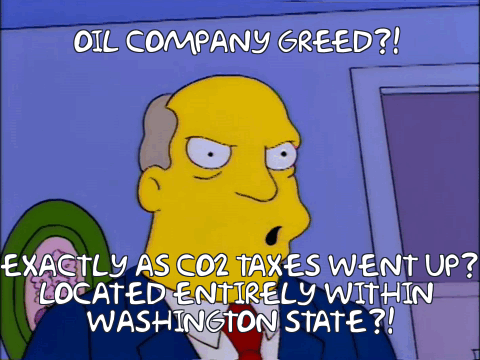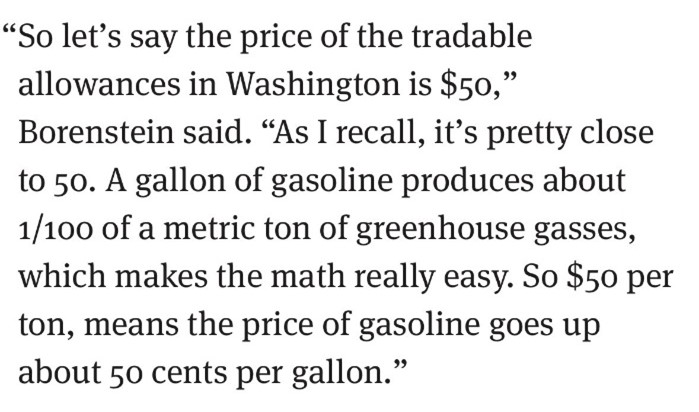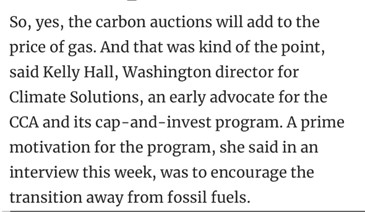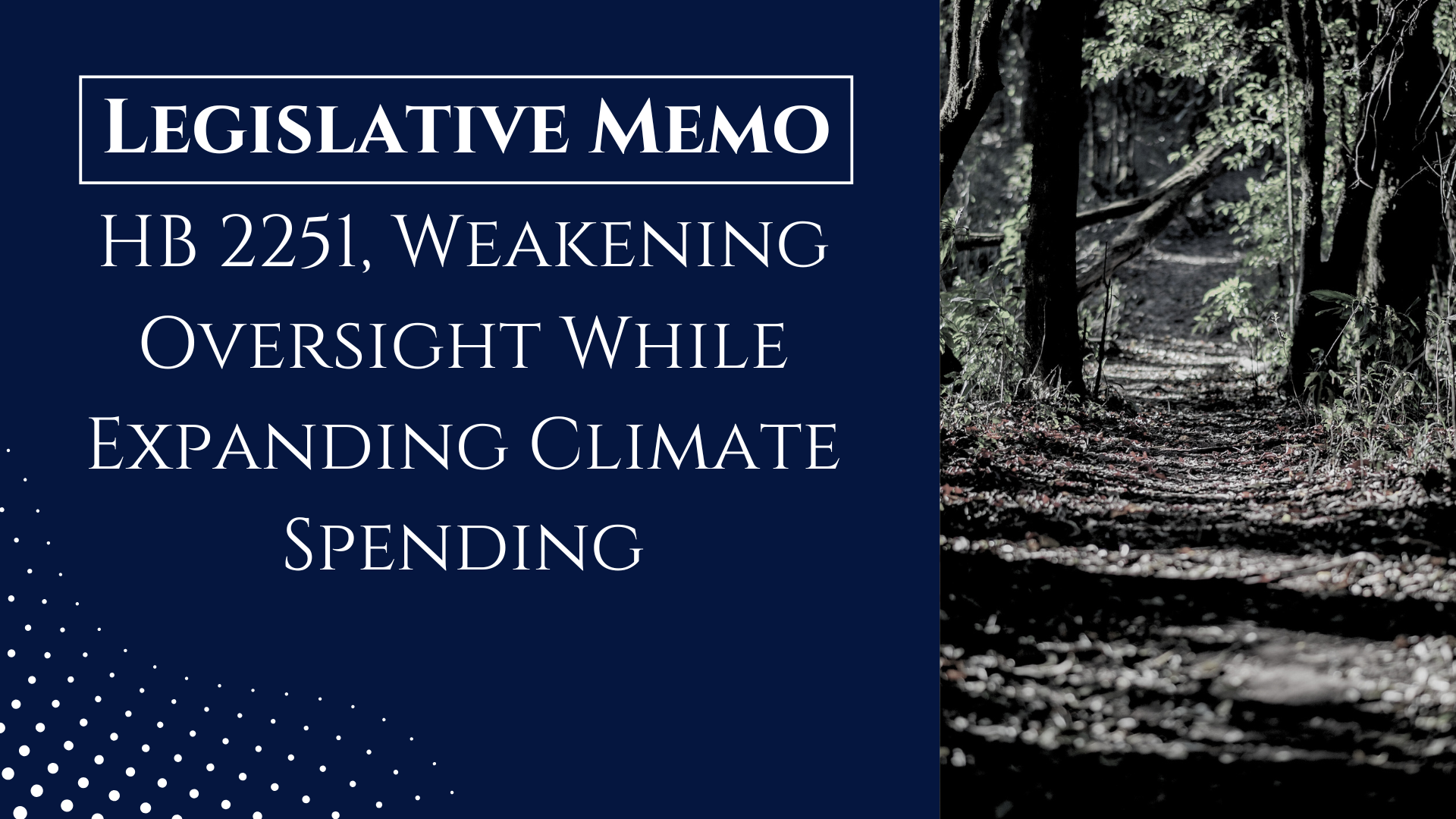For the first time in history, Washington state’s gas prices were the highest in the nation last week. Even though increasing gas prices is the goal of the state’s new tax on CO2 emissions, advocates for that tax are scrambling at the news, blaming everyone but the tax for the increase.
Here are a few thoughts about the politics of the state’s climate policy and some of the myths that are being spread about the cause of our high gas prices.
1. Oil company greed!
Most of the effort to shift blame away from the tax on CO2 emissions is to claim “greed” by the oil companies is the reason Washington’s prices are suddenly the highest in the nation. There are several problems with this.
While the left screams about oil company profits, the state of Washington is the largest beneficiary from each gallon of gas sold in the state.
 Between the 49.4 cent per gallon gas tax and the 44.3 cent per gallon tax on CO2 emissions, the state takes. 93.7 cents per gallon.
Between the 49.4 cent per gallon gas tax and the 44.3 cent per gallon tax on CO2 emissions, the state takes. 93.7 cents per gallon.
Already the state has raised nearly $900 million from the tax on CO2 emissions alone.
The most charitable way to characterize that is the pot calling the kettle black. The most accurate way is to describe it is hypocritical.
Additionally, Washington’s prices began to increase faster than other states precisely when the tax took effect. That is not a coincidence.
The people who make this claim need to explain why that “greed” seems to stop at Washington’s borders. Our prices have increased much faster than Idaho, Oregon, and California, to name a few. Apparently, oil companies are only greedy in Washington state.
Others have pointed to maintenance on the Olympic Pipeline as the reason prices are going up. That maintenance also impacts Oregon, and yet our prices have increased by about 35 cents per gallon more than Oregon’s since the beginning of the year. Pipeline maintenance is a routine event that has occurred in the past and it didn’t push Washington’s gas prices to the highest in the nation. Something is different this time – the tax on CO2 emissions.
2. We are right…for now
We have received a lot of credit for predicting the impact of the tax on CO2 emissions that were “remarkably accurate.” Our numbers were based on predictions from the Department of Ecology’s own study. We simply connected the dots, using the calculations that everyone else uses, from the State of California to the EPA, to determine the price on gasoline.
The Department of Ecology staff ignored that, even saying, “The trouble with how Mr. Meyers [sic] approached these calculations, and his piece, is that you know, he did do some math, it's just not math that’s reflective of reality.” Well, the math turned out to be almost perfectly reflective of reality.
And the claims by Ecology staff were nowhere close to reality.
To be clear, although the prices are very close to our projections now, that will change. The markets will fluctuate and the impact on gas prices will change. Next year the cap on emissions will get tighter, which is likely to drive costs up even more. The key is that we weren’t afraid to do the math and go where it led, while the governor, the Department of Ecology, and some in the media chose politics over honesty.
3. The price impact of the tax on CO2 is “beyond controversy”
Despite the many excuses and rationalizations being offered by the supporters of the tax on CO2 emissions, our prediction that it would raise gas prices significantly is not controversial.
Who says so?
 Severin Borenstein, who helped California develop their CO2 cap-and-trade system. He told The Seattle Times that “it is beyond controversy that Washington’s carbon-pricing program contributed to the jump in prices.” When asked how much it would increase the price of gas, he noted that the amount is “easy to calculate.”
Severin Borenstein, who helped California develop their CO2 cap-and-trade system. He told The Seattle Times that “it is beyond controversy that Washington’s carbon-pricing program contributed to the jump in prices.” When asked how much it would increase the price of gas, he noted that the amount is “easy to calculate.”
His back-of-the-notepad calculations note that since a gallon of gas emits about 1 percent of a metric ton, “$50 per ton means the price of gasoline goes up about 50 cents per gallon.”
This is slightly high. One gallon of gasoline emits about 19.5 pounds of CO2 per gallon, making it about 0.88 percent of a metric ton.
Danny Westneat, a supporter of the tax on CO2 emissions, put it bluntly: “Of course carbon fees increase the price of gas. That’s the point!”
4. Climate advocates admitted the tax on CO2 increased prices…until it became a political liability
Climate activists were clear that gas prices would go up until this week, when Washington’s gas prices became the highest in the nation. Realizing that their policy was in danger of becoming unpopular, they went into full spin mode.
For example, Climate Solutions is (unsurprisingly) blaming oil companies. They tweeted, “Jack up gas prices, rake in huge profits, then blame environmental policies and ignore the monopolistic forces at play. That’s the oil industry playbook. Don’t fall for it!”
 One weekend before, however, they were saying something very different.
One weekend before, however, they were saying something very different.
In an editorial titled, “You’re now paying for the carbon from car’s tailpipe,” Climate Solutions’ director told the Everett Herald that raising prices was a “prime motivation for the program.” She went on to say, “I don’t want to pretend that fossil fuels aren’t going to get more expensive; that is part of the point of this policy.”
What a difference a week can make.
It is one more example in a long list demonstrating that relying on politicians for environmental policy is foolish. When push comes to shove, politicians will almost always put their political interests ahead of honesty and rational policy.
5. Ramping up the “strategic misrepresentation.”
Some admit the only way to get the tax on CO2 emissions is to lie. In his column on Washington’s rising gas prices, Danny Westneat argues that if politicians are honest, they won’t get what they want, and argues in favor of “strategic misrepresentation.”
He writes, “after watching voters in our liberal, green state torpedo one climate initiative after another, I’ve concluded it might be impossible to pass one without strategically misrepresenting it to the public.”
In the second-to-last sentence, Westneat hedges a bit, writing, “Should top officials be more honest about all this? Absolutely they should.” In the very next sentence, he makes it clear that, ultimately, dishonesty is acceptable, saying, “But no hogwash or baloney: Would anything ever pass if they were?”
He thinks we need a tax on CO2 emissions – “In the end, I’m OK with the 50 cents per gallon” – and if leaders and the media must lie to get the policy, so be it.
6. Climate politics and the English language
“Strategic misrepresentation” isn’t the only intentionally misleading turn of phrase being used by supporters of the tax on CO2 emissions.
Ecology Director Laura Watson told The Seattle Times that she doesn’t like to call the cost of the state’s CO2 allowances “taxes,” but prefers, “market-based programs that place compliance obligations on regulated businesses.” OK then.
It calls to mind the words of George Orwell in his essay, “Politics and the English Language,” written in 1946. He wrote, “In our time, political speech and writing are largely the defense of the indefensible. … Thus, political language has to consist largely of euphemism., question-begging and sheer cloudy vagueness.” He went on to write, “The great enemy of clear language is insincerity. When there is a gap between one's real and one's declared aims, one turns as it were instinctively to long words and exhausted idioms, like a cuttlefish spurting out ink.”
7. In the frenzy to make excuses, tax supporters don’t even get the policy right
When politicians and activists feel cornered, they begin to make whatever argument they think will stick. Several of the claims have simply been wrong about the law itself.
For example, State Senator Joe Nguyen, the Chair of the House Energy, Environment, and Technology committee tweeted, “If 1 producer has a refinery in WA that is subject to CCA and another does not, why would they charge the same price?” Based on this, he alleged “price gouging” or “collusion.” But this misunderstands the law, known as the Climate Commitment Act or CCA.
All gasoline, no matter where it was refined, is subject to the tax on CO2 emissions. That’s why all gas prices go up by a similar amount – they all face the same tax.
Sen. Nguyen then claimed that what he meant was something different – that the refineries themselves are obligated to pay for the emissions of their operations, not just the gasoline they produce. This is true, but there is a big problem with this claim: refineries have zero obligation to pay for those emissions this year. The law gives refineries and other “Energy-Intensive, Trade-Exposed” industries free credits to cover their emissions this year, meaning in-state manufacturers have no more obligation than out of state refiners.
Making an accusation of collusion based on nothing shows how much pressure supporters of the tax on CO2 emissions are feeling.






